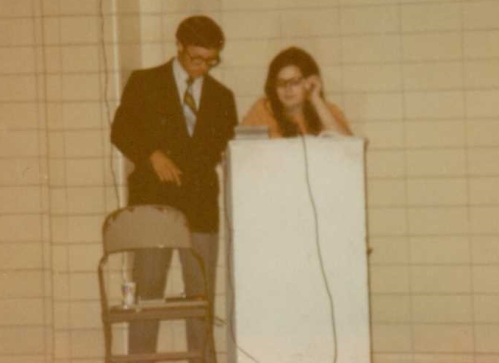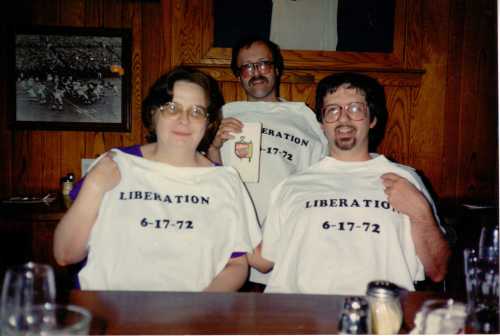“Just imagine how awful we’d feel,” I told Betty one day, “if we got to the end of our lives and never produced our play. Especially if we really could have. We’d always regret it.”
That’s how I pushed Betty to produce Liberation. I knew she wasn’t entirely convinced, but that was her way. She was critical, skeptical of everything. It was her strength.
Twenty years earlier we had done summer theater together. After rehearsals, we’d adjourn to Betty’s apartment to tell jokes, sing songs and laugh our way to midnight. Those times would become our “good old days.”
We worked on a variety of projects over a few summers, and developed a talented circle of friends. Betty was 2 years my senior, always the stage manager and sergeant-at-arms. She kept us in line during our silliest youthful moments.
With youthful exuberance we decided it would be a great idea to write our own musical, a big production like those we had been part of in the past. Betty and I would write the book. Michael, who had overwhelmed us with a beautiful original song about our group called “Friends,” would compose the music. I had already worked on a Christmas song with Michael and thought I could write the lyrics.
Maybe in a year or two, we thought, it could become our very own summer theater production. What a terrific idea it seemed. It didn’t take long to come up with what we thought was a the right story.
It was the middle of the Women’s Liberation era and we decided to use the movement as the setting. We did not envision a drama but rather a lighter treatment, the story of a strong woman being kept from advancement because she was a woman. In our minds “Jackie” was like Mary from the Mary Tyler Moore Show. Not quite as outspoken as the leaders of the women’s movement, but determined to succeed.
Betty and I went to work on our outline. We needed the “who, what, where, when, how.” “Why” was easy. We wanted to do it and didn’t need a better reason. You can guess who crafted the strong-willed women in the story. Of course we used people we knew as models for some characters, but I can never reveal that information unless we win a Tony. Then we can do whatever we want.
As we wrote the story, I handed off lyrics to Michael for various songs we wanted. We weren’t quite sure how all the songs would fit, but we knew what we wanted to say. After seven months of working on the story, with more than half a dozen songs in hand, Betty and I dumped everything and started over. It had become a complete muddle.
The failed attempt taught us what we needed to know . We defined each character and his or her role in the story. We had the setting, the conflict, the resolution. No phony Hollywood love-story ending with characters living happily ever after, but nonetheless a happy ending — differently happy.
Soon we were writing scenes in order. The title tune became a collaborative effort as Betty and I tossed ideas back and forth, then threw them at Michael while he pounded out chords on Betty’s piano. A second act song was written first. A comedy song was a labor of joy. The song we envisioned for the main character, “I Believe,” was Betty’s favorite. The show took over a year to write but when it was finished, we were proud of the book and its songs. It was what we wanted.
Sadly, when it came to marketing, we fizzled. We showed the book to a few people we thought might help us, but nothing came of it.
Our labor of love was for Betty real labor. She did a LOT of typing. This was before personal computers, so she typed and retyped copies using carbon paper (look it up!). I have no idea how many times she retyped scenes to incorporate changes. I have not spent as much time typing here as Betty did on Liberation.
Twenty years later, I told Betty the play would not be dated if we told it as a flashback. The main character would have again hit the glass ceiling and would be inspired to move forward by remembering what had happened twenty years before. We needed a new opening, ending and one more song.
She agreed to give it a go. So, Betty and I toured theaters, met with theater companies, brainstormed strategies to raise money. We wrote new material, polished old material.
Michael, however, had moved on and was reluctant to revisit the show, but we needed him. We not only wanted him to write a new song, but to score the entire show. That meant arrangements, scene change music, an overture. We worked hard on convincing him. He eventually gave in to our constant nagging reminders about “the good old days.”
Betty, as always, was fueled by cigarettes and TAB cola. Again she typed all the drafts and burned up hours on the phone with me discussing the new material. When I finished crafting an original speech for the main character, in true Betty fashion, she said, “Richard, that’s a great speech. No women would ever say that, but it’s a great speech.”
“OK”, I replied, a little deflated, “What would she say?” Betty gave voice to the main character and hero of our story. In the end we were more than pleased.
The story of the Liberation’s production by a local theater company on a large stage with an orchestra is a sad story you’ve heard before. We had no control of the final show. The company mounted a political drama with music. It wasn’t the musical comedy we’d written. On my own, I agreed with the theater company to scale back the musicians for the third weekend and cancel the fourth and final weekend. I didn’t consult my colleagues; we were losing money we didn’t have.
It had taken a couple of years from reviving the idea to getting it produced. The work we did the second time around was just plain work.
Betty and I drifted apart after the show closed. She was terribly disappointed that my salesmanship did not put her dream on stage. She had dedicated a big part of her life to a youthful wish, and it had come to nothing.
A few years ago I learned Betty had emphysema. No surprise really. She had been a long time chain smoker. Then one day I got an email from Michael. He told me Betty passed away. He had read the news in an alumni newsletter and was crushed no one had informed us.
I was stunned. Somewhere in the back of my mind I always believed I’d give Betty her show, the one we originally envisioned. I imagined I’d drag her away from her typewriter and give her the spotlight she’d never shared when we performed.
Maybe now she’s been liberated from her suffering, but it is not the Liberation she deserved.
Find the lyric to the song on Sunday Night Blog here.
Categories: Anecdote, In Memorium, Rich Paschall




 LIBERATION – A MUSICAL THAT ALMOST WAS
LIBERATION – A MUSICAL THAT ALMOST WAS
The main thing is you tried and it was produced. I always think you shouldn’t go to your death bed and say, “I wish I’d.” It doesn’t even matter if you fail for you can say “I had a go.”
LikeLiked by 1 person
We had a go of it.
LikeLike
You can do no more.
LikeLiked by 1 person
Reblogged this on rjptalk and commented:
Sometimes rather than write a commentary on something, a short story or a Top Ten list, I write a true story from my life. This is one of those stories. Be sure to click “View original post” to end over to SERENDIPITY for the rest of this reminiscence.
LikeLike
Lovely song! Melody and everything, like a proper song!
LikeLiked by 2 people
We wrote many songs for the show and I even have a few on cassette.
LikeLiked by 2 people
Cassette. Wow. I don’t even have a machine to play them anymore. We used to have a big fancy one … but years ago. Now, CD/DVD … or downloaded. Times have changed.
LikeLiked by 1 person
We recorded a few songs at the time, but I have been unable to convert more than two to digital for Soundcloud
LikeLiked by 1 person
Rich, I was hoping for a Hollywood ending to this one. It has everything but that. I’ll still hope there’s another piece…….
LikeLiked by 1 person
Maybe there will be a Hollywood ending, but that is not always the way in real life.
LikeLiked by 2 people
It’s a crappy business but at least you tried. Good for you all.
LikeLiked by 2 people
Thanks. We just had to do it.
LikeLiked by 1 person
True, Rich. But you went in nobody. You’ll come out a star.
LikeLiked by 1 person
That’s cuz we are gonna build a barn and put on a musical.
LikeLiked by 1 person
Just don’t let Roy Moore into the barn to judge the show.
LikeLiked by 1 person
Kevin Spacey applied to be artistic director. We are not letting him in either. The billy goat is standing guard.
LikeLiked by 1 person